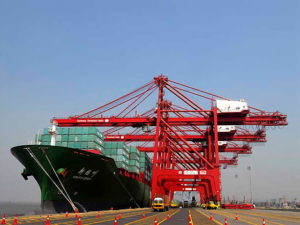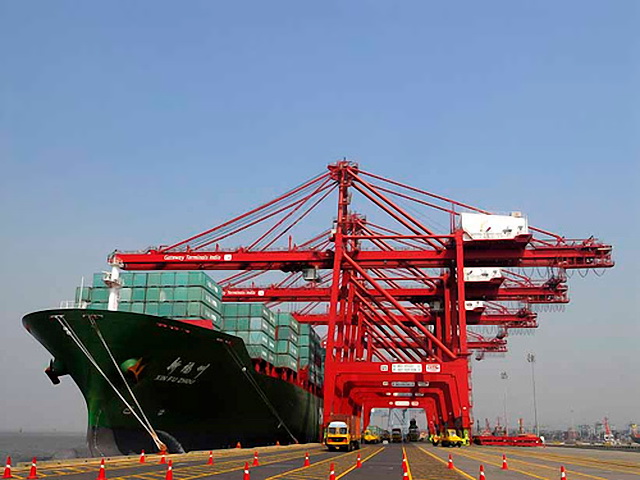 The shipping industry has welcomed the adoption by the International Maritime Organization (IMO) on April 13 of an initial strategy to further reduce greenhouse gas (GHG) emissions from ships, but expects challenges and hard work ahead if the IMO ambitions are to be realized.
The shipping industry has welcomed the adoption by the International Maritime Organization (IMO) on April 13 of an initial strategy to further reduce greenhouse gas (GHG) emissions from ships, but expects challenges and hard work ahead if the IMO ambitions are to be realized.
The International Chamber of Shipping (ICS) said that “this is a ground breaking agreement—a Paris Agreement for shipping—that sets a very high level of ambition for the future reduction of CO2 emissions.”
It added, “We are confident this will give the shipping industry the clear signal it needs to get on with the job of developing zero CO2 fuels, so that the entire sector will be in a position to decarbonize completely, consistent with the 1.5 degree climate change goal.”
The group further said, “The agreed IMO objective of cutting the sector’s total GHG emissions by at least 50% before 2050, as part of a continuing pathway for further reduction, is very ambitious indeed, especially when account is taken of current projections for trade growth as the world’s population and levels of prosperity continue to increase.”
ICS, the principal trade association representing merchant ship owners and operators across all sectors and trades, acknowledged that some governments would have preferred to see even more aggressive targets adopted.
However, it argued that a 50% total cut by 2050 can realistically only be achieved with the development and very widespread use of zero CO2 fuels.
“ICS believes that if this 50% goal is successfully met, the wholesale switch by the industry to zero CO2 fuels should therefore follow very swiftly afterwards,” it added.
Ambitious but doable
ICS said that the efficiency goal that has been agreed by IMO member states for the sector as a whole—a 40% improvement by 2030, compared to 2008, and a 50% to 70% improvement by 2050—is also “extremely ambitious but probably achievable.”
“But this can only be accomplished if governments recognize the enormity of this challenge and facilitate the rapid development of new technologies and fuels,” it pointed out.
Similarly, the World Shipping Council (WSC), an association of liner shipping companies which transports over 90% of international containerized trade, welcomed the IMO agreement.
“As a practical matter, the size of the planned emissions cuts makes it clear that the shipping industry can only meet these objectives by a transition over time to new fuels and new propulsion systems,” it said in a statement.
However, WSC said this also means that “the real work lies in front of us.”
“It is now clear that the long-term future of the international shipping industry will not be based on burning fossil fuels. What is not clear is which technologies and which fuels will allow the industry to continue to serve world trade sustainably in the next half of this century and beyond.”
It added: “Moving from where we are now to a new energy profile for the future of shipping will not happen on its own. The industry faces a substantial engineering challenge to identify, develop, and deploy the new fuels and new technologies that will eliminate carbon emissions from shipping.”
WSC president and CEO John Butler said: “As hard as it was to reach political agreement this week, what comes next will be harder. We have to shift from a political mindset to an engineering mindset. There are no quick fixes here, but we can solve this problem. To do that we must establish a maritime research and development effort that will deliver the tools necessary to transform the industry. That is the next step for the IMO.”
For its part, the Baltic and International Maritime Council (Bimco) expressed satisfaction with the GHG strategy adopted by the IMO, calling the target ambitious, but not impossible:
“In Bimco we believe that the industry can deliver on this target—even if we don’t exactly know how, yet,” the group said in a release.
Bimco is the largest shipping association in the world, with around 2,000 members across the industry, representing 56% of the world’s tonnage.
Clear goal
“The strategy shows that there is only one road ahead, and that is the road towards decarbonization. The strategy reinforces existing IMO regulations to enhance the energy efficiency of ships and sets out the long-term goals. This will guide the development of new technology and the design of new ships.”
Bimco sees zero carbon emissions as a realistic goal for the second half of this century, but investments in research and technology are required to get there, it said.
Likewise, the European Community Shipowners’ Associations (ECSA) said it fully supports the initial strategy.
‘This is a very important signal for the shipping industry and the maritime cluster to work full steam ahead to reduce GHG emissions. The ship is launched and on its voyage for a strong and sustainable future of the shipping industry and the world,” ECSA said.
“‘The shipping industry is now the first global sector with concrete figures for the reduction of GHG emissions. And also that the ultimate goal is full decarbonisation is an achievement for which the IMO should be commended.”
Photo: Jaxer





